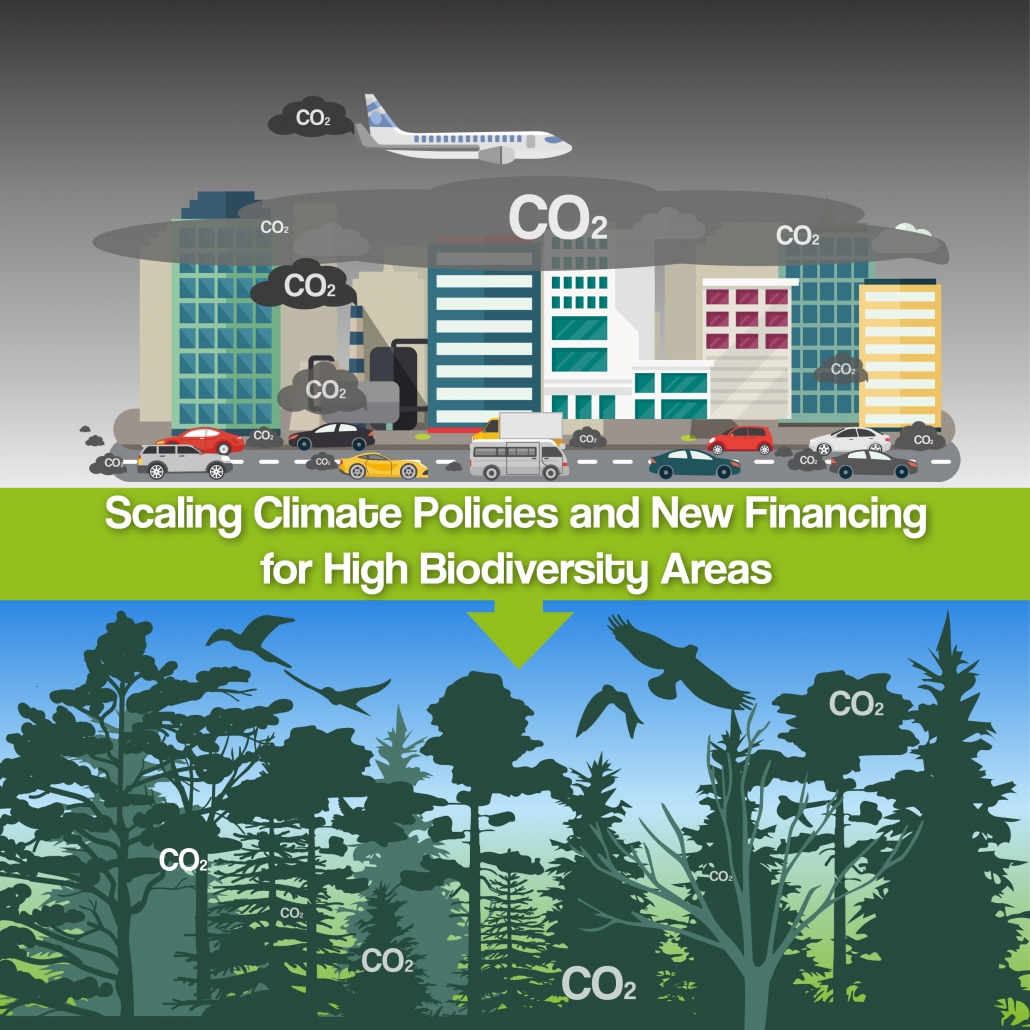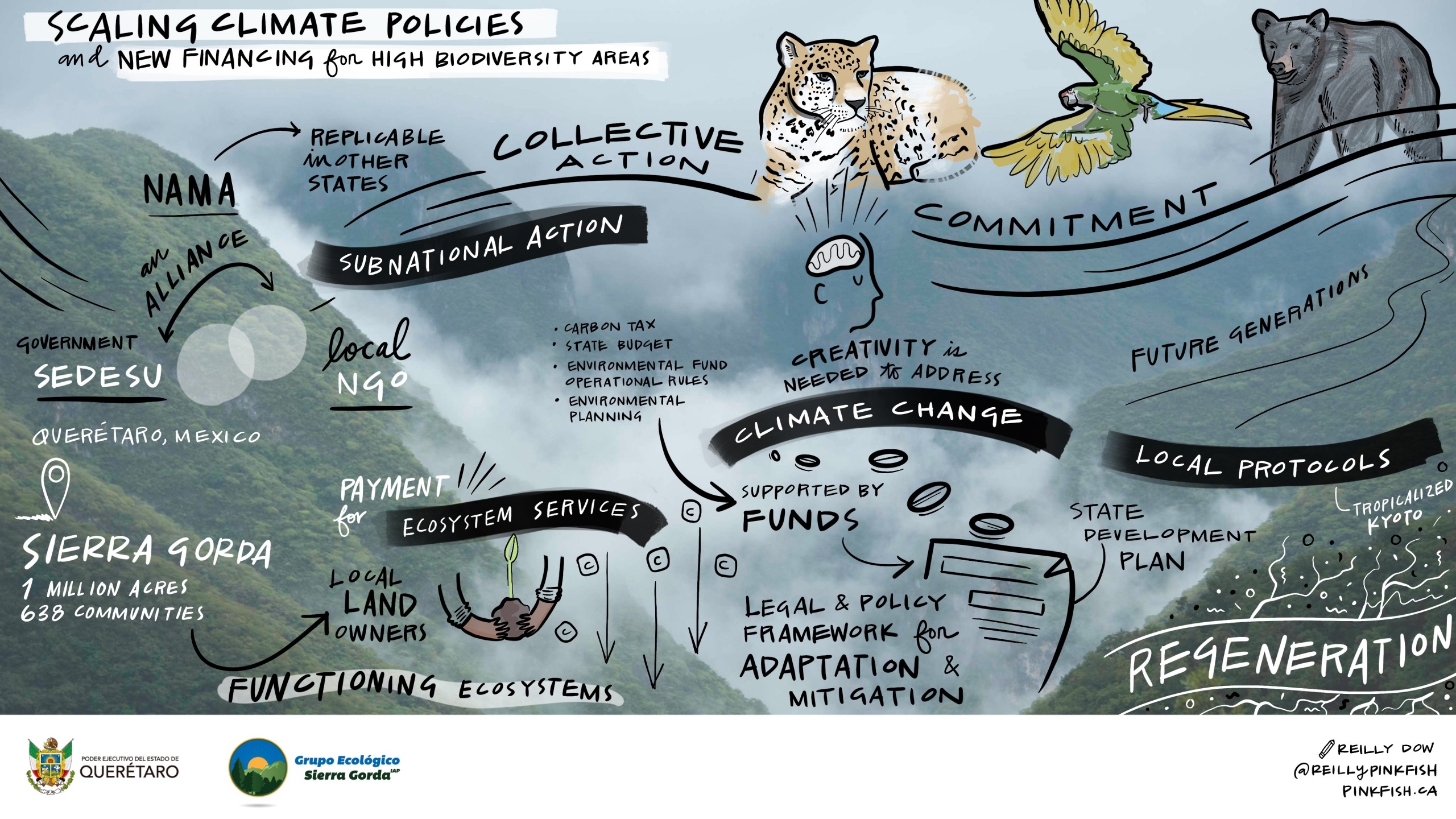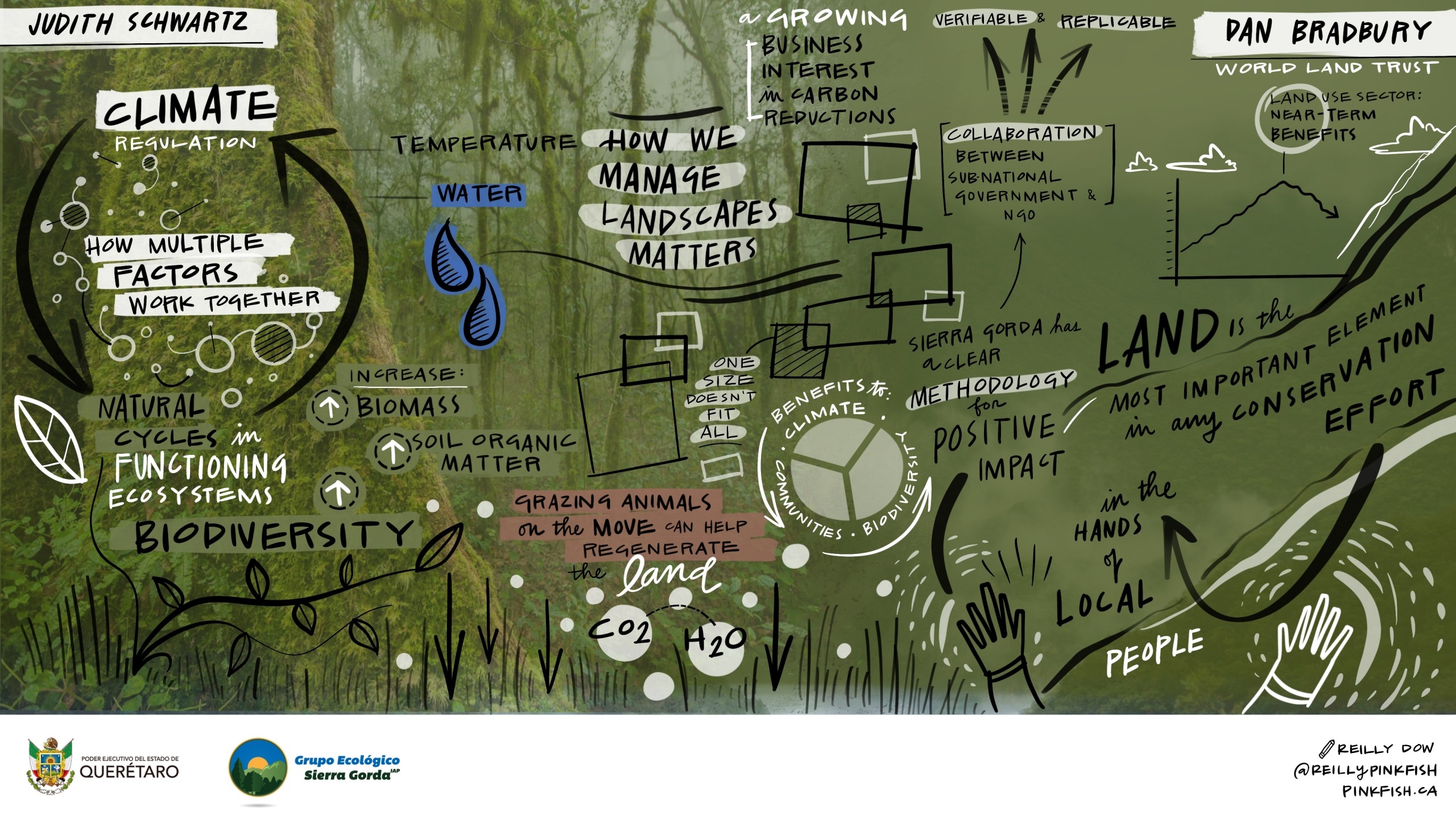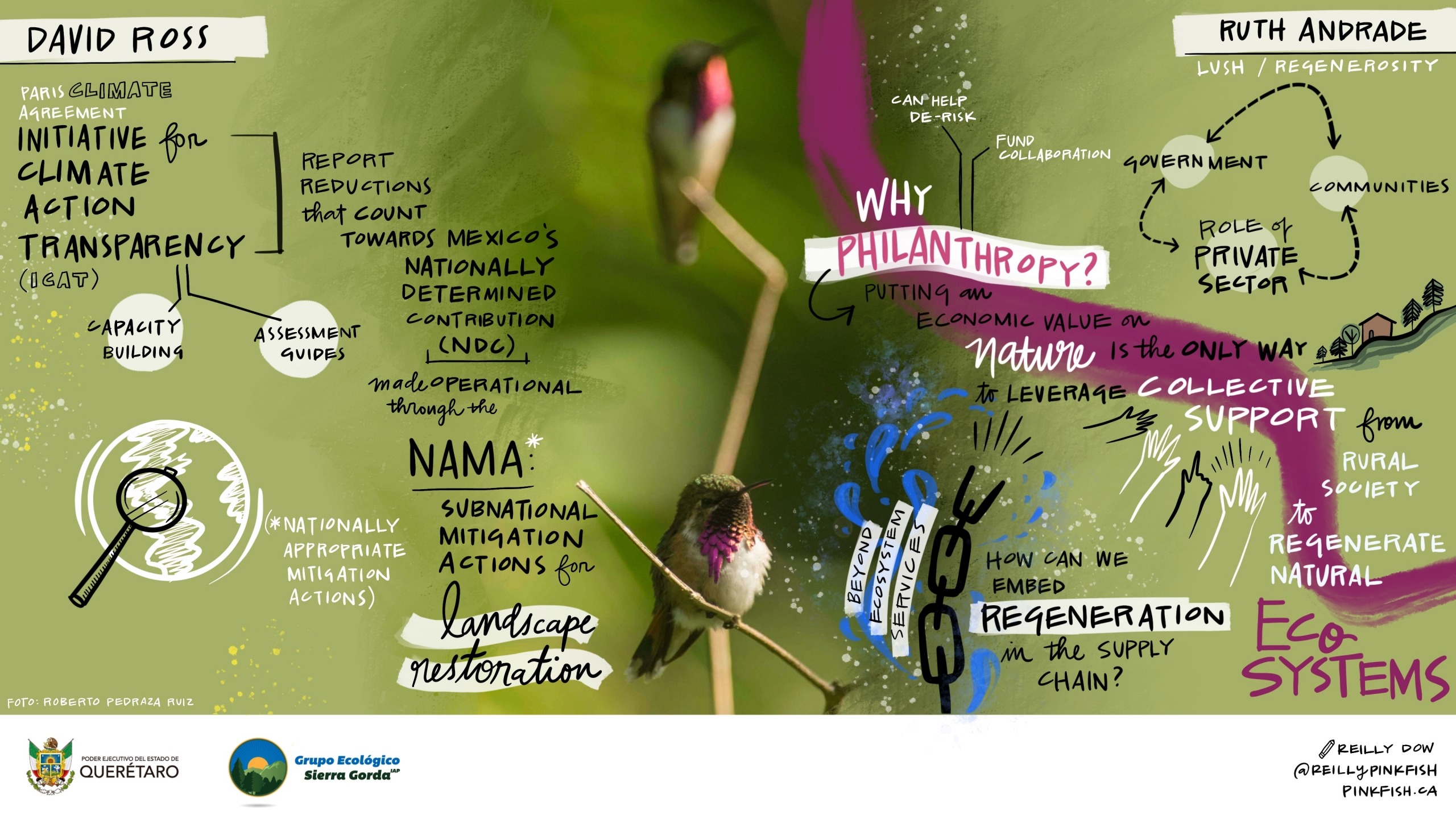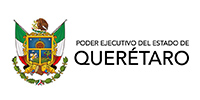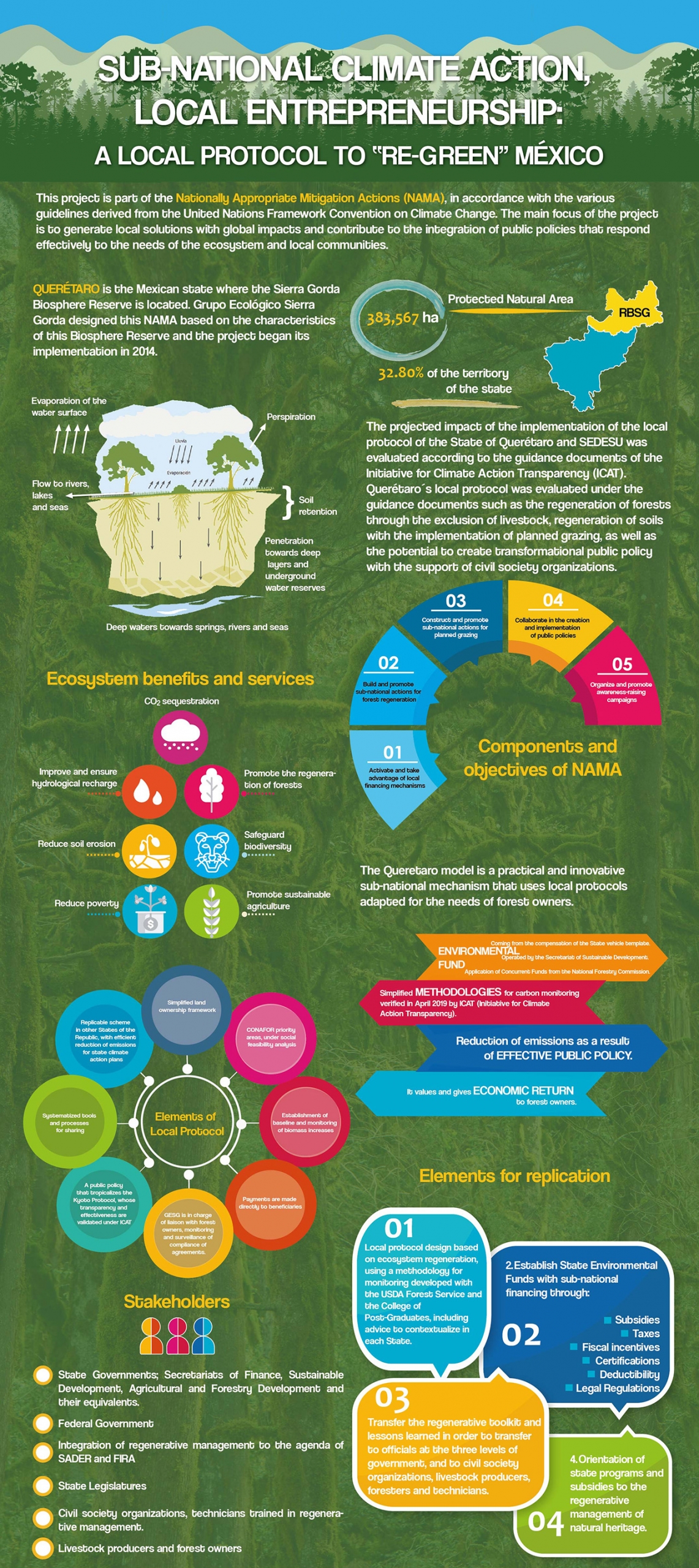Friday, September 25, 2020 9:00 AM (CDT)
Organized by: Under2° Coalition/The Climate Group, Gobierno del Estado de Querétaro, Grupo Ecológico Sierra Gorda I.A.P.
Sierra Gorda in Querétaro, México has been a pioneer in resolving the gaps that exclude rural landowners of high biodiversity areas from the climate agenda for decades, a model whose time has come. The global climate change protocols and regulated carbon markets exclude critical beneficiaries from obtaining funding for immediate adaptation and mitigation action and adopting regenerative practices for the forest, biodiversity, and soils.
Last week, Prince Charles inaugurated the 2020 Climate Week, exhorting everone to take climate action. In its eleventh year based in New York, this year was held primarily online. The Government of Querétaro and the Grupo Ecológico Sierra Gorda represented Mexico by presenting innovative political and social solutions to protect and regenerate nature.
Decades before “regenerative” became a buzzword, Sierra Gorda was applying regenerative solutions by weaving partnerships with civil society, the private and the public sectors to restore forests, soils, and our common future. Grupo Ecológico Sierra Gorda has adapted the global protocols to the local context in central Mexico converting the region into a living laboratory whose proven out its model faster than global carbon markets that have never taken off. And, they have designed breakthrough strategies to regenerate the landscape, economy and local culture, with nature at its core.
The model is a holistic approach to nature-based solutions for forests and soils, developed by the State of Querétaro and Grupo Ecológico Sierra Gorda and incorporates the critical areas of valuing ecosystem services, community development, public policies, and access to philanthropic financing to reduce the risk for future impact investors.
Across the world, particularly in the global south, endangered ecosystems need the best tools and regenerative practices to survive extinction, with viable international standards for locally adapted protocols and transparent monitoring and evaluation methods, to catalyze subnational policies and philanthropic investment.
In an effort to raise awareness of the challenge Querétaro has faced and the new commitment to promote a regenerative agenda among the over 250 subnational governments who are members of the Under2° Coalition. The governor of Querétaro is the new Co-President of the Under2° Coalition for Latin America and has led with this model to be replicated across the country. The panelists on September 25th shared their visions for the project of regeneration of ecosystems and the importance in the fight against climate change, moderated by actor and environmental activist, Alfonso Dosal, a rising actor and environmental activist.
Martha “Pati” Ruiz Corzo, Director of Grupo Ecológico Sierra Gorda, explained their project which involves removing livestock to protect forests and allow for the natural regeneration of soils and carbon capture.
Ruiz Corzo underlined the importance the project has in Latin America as a model of government and civil society combining forces to mitigate climate change impacts as well as poverty saying, “This is a call to action, it is an emergency. We are losing wisdom, like water falling through our fingers. My call is a call to your heart to love our planet. This is the moment to raise a wave of action. It depends on us, not the youth but the adults of today”
Marco de Prete Tercero, Secretary of Sustainable Development in the State of Querétaro, explained that the project is financed by the State Development Plan and the Sustainable Development Fund which have as their mission, ecological planning, protecting biodiversity, addressing climate change, air quality, and waste management and clean water.
The Secretary added that the State of Querétaro and Governor Francisco Domínguez Servién feel very proud to be participating as co-director of the Under2° Coalition representing Latin America and very committed to maintaining a healthy environment through public policies and contributing to the world learning libraries. Prete Tercero said, “Latin America has very few resources destined to the protection of the environment, and it is here where our creativity should come from, to institutionalize programs for the protection of the environment and to show the world that government and civil society can work hand in hand on something so simple as caring for our environment.”
The writer, Judith Schwartz, author of “The Reindeer Chronicles: And Other Inspiring Stories of Working with the Land to Heal the Earth” (Chelsea Green Publishing, August 2020) that added to the conversation the importance of ecosystems as climate regulators. She stressed the role of carbon and water as allies in the recuperation of the cycles of energy and nutrient cycles between the soil and plants and animals. Schwartz said, “Healthy vegetation promotes the water cycle, regulates the temperature, controls precipitation, and attracts carbon back into the ground.”
Dan Bradbury, from the international charity World Land Trust spoke about the Carbon Balanced projects, of which Sierra Gorda is a part. He confirmed that all of the projects are designed according to tough standards that assure that the offsets can be quantified, verified, and monitored, for the highest quality and results. He added that the most important elements of any conservation program are the earth and the participation of the communities that live and work there. Bradbury said, “The methodology is the most important in all of this, carbon projects must meet certain criteria: climate, biodiversity, and community. This project [model for forest and soil regeneration by the State of Querétaro and the Sierra Gorda Ecological Group] has shown that it has everything, and that is key.”
Ruth Andrade, from Lush Cosmetics and a new venture “Regenerosity”, shared from the perspective from the world of philanthropy on how regenerative projects can reduce risks for inversions and can pursue fundraising.
Finally, Ruiz Corzo concluded that this is the moment to teach new intangible values, to go forward, and create a new economy with new returns on investment. She talked about the importance of empowering rural communities to regenerate their ecosystems and thanked all the participants and collaborators of the project saying, “We are together in this collective effort, it is the moment for true generosity and to put our hearts to work to move any possibility of environmental efforts. For the biosphere to lose its ancient wisdom would be unforgivable for our generation.
The following videos and articles give witness to the progress of the NAMA project “Subnational Mitigation Actions for the Regeneration of Landscapes”:
2019 Climate Week NYC 2019
2019 Under2° Coalition in Mexico: “Acción climática sub-nacional, emprendimiento local” Querétaro
2018 Global Climate Action Summit
2017 Mexican Senate and Querétaro State fora.
References:
UNFCCC NAMA REGISTRY: Subnational Mitigation Actions for the Regeneration of Landscapes
Regenerating Forests and Farmland in Mexico´s Sierra Gorda. The Climate Group / Under2° Coalition
Regeneración de Bosques y Tierras Agrícolas en la Sierra Gorda, México. The Climate Group / Under2° Coalition
DOCUMENTARY “Protecting the Heart of Mexico,” 22 min. World Land Trust production, Executive Producers: Dan Bradbury & Claire Whittenbury, Filmed & Edited by: Kristin Gates & Jeremy Là Zelle

